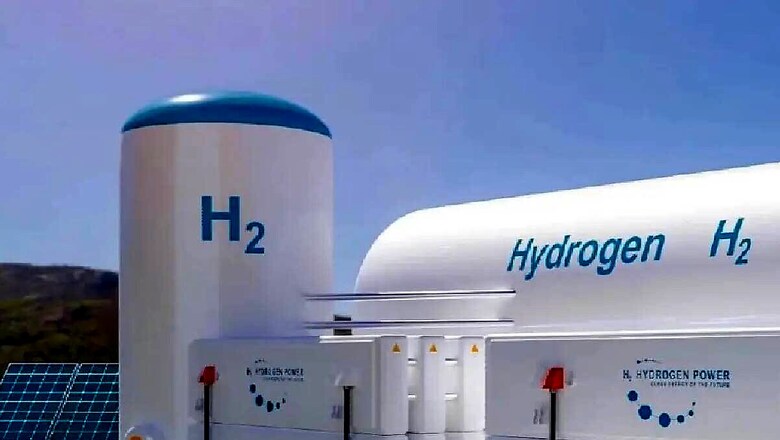
views
In the recent list of the 20 most polluted cities in the world, 14 are in India. We all hear news every November about the national capital and many other cities choking, with AQI reaching even 999, which is the limit of measurement itself. A political debate follows as the citizens cough and sneeze, where opposing sides annually invent new ways to blame each other. Air pollution kills nearly 23 lakh Indians every year, which is four times the total death toll of Covid-19. Is there a real solution which can give us clean and healthy air and the breath of life we all deserve?
The solution is perhaps already there — Hydrogen fuel. Let us understand.
Hydrogen is the lightest element in the universe, it is also the most abundant element in the entire universe, including on Earth. However, it is extremely rare in our atmosphere and mostly exists as a key part of water, each water molecule having two atoms of hydrogen along with one atom of oxygen. If water is made to go through a chemical process called electrolysis, a current is run through it. It can break down and produce hydrogen fuel.
Hydrogen fuel is a zero-emission fuel burned with oxygen to produce energy, with water vapour as its only byproduct. We also need to ensure that the electricity used to generate this hydrogen fuel is from green renewable sources like solar power and wind energy. This type of hydrogen is called Green Hydrogen. There is no carbon dioxide or any other harmful particles created under this process and the AQI is not harmed at all. During the G20 summit, Prime Minister Narendra Modi gave this vision for the nation to follow this path of creating hydrogen fuel, and Indian companies are already leading the world in making this process a success.
Hydrogen fuel can also be created from natural gas. Countries such as the UAE and Saudi Arabia, which are rich in petroleum, are pursuing this path. But this process creates carbon dioxide, hence it is called Gray Hydrogen. Even if the carbon dioxide is captured and prevented from going into the atmosphere, it is not a perfectly clean process and then is called Blue Hydrogen.
Green Hydrogen is already being pursued on an industrial scale even by big companies like Reliance. Companies like Tata and Mahindra, along with Toyota and Cummins are fast advancing in developing hydrogen fuel engines for cars and trucks. At this rate, you can expect to daily ride a hydrogen bus, or a hydrogen train and own a hydrogen fuel car before 2030.
What about the impact of this?
The transportation sector is responsible for approximately 24 per cent of direct CO2 emissions from the combustion of petrol and diesel. In a city like Delhi, this figure is above 30 per cent. With green hydrogen vehicles, this pollution will be cut down to zero. This would single-handedly bring down Delhi’s air from severe to medium levels of pollution. Coupled with some other initiatives regarding crop burning, we have a clear path to bringing the pollution levels even in densely populated cities like Delhi to 1990s levels. 23 lakh lives will be saved annually and roughly 5.8 years will be added to the lifespan of every Indian.
Then there is the economic impact. Oil and gas is by far the greatest import bill for our economy. We paid Rs 12 lakh crore to oil-rich countries of the world in 2022 to get petroleum fuel. That is 18 times of what we spend on our schools or 14 times our total spending on healthcare. Imagine if we could use this money we are forced to send to oil-rich nations, many of whom are hostile to us, and invest it in our people – their well-being and creating our local industries in the sector. So many jobs can be created by this scientific revolution of hydrogen fuel.
India’s Green Hydrogen mission is superior and 100 per cent clean. But like any great mission, there are challenges. First is that of developing efficient engines and affordable vehicles which run on this new fuel. Our domestic industries are so strong and our market so big that this is being overcome at an unexpected pace. Second, is the issue of ensuring safety features in such engines as hydrogen is more explosive than petrol. Third is the issue that green hydrogen would need investments in solar power and wind energy, making it costlier to generate than blue hydrogen; presently it is about 1.5 times more expensive to create.
India has already set the target of bringing investments of Rs 8 lakh crore and creating over 6 lakh jobs by 2030 in this sector alone, with many more times of this investment and employment in developing vehicles and service networks of hydrogen vehicles. A very optimistic time lies ahead, where we will not only be able to finally give clean air to all but also create the single biggest boost to the economy ever done by saving the oil import bill.
The author is Founder, Dr. Kalam Centre and Homi Lab and former Advisor to Dr. APJ Abdul Kalam. Views expressed in the above piece are personal and solely that of the author. They do not necessarily reflect News18’s views.



















Comments
0 comment